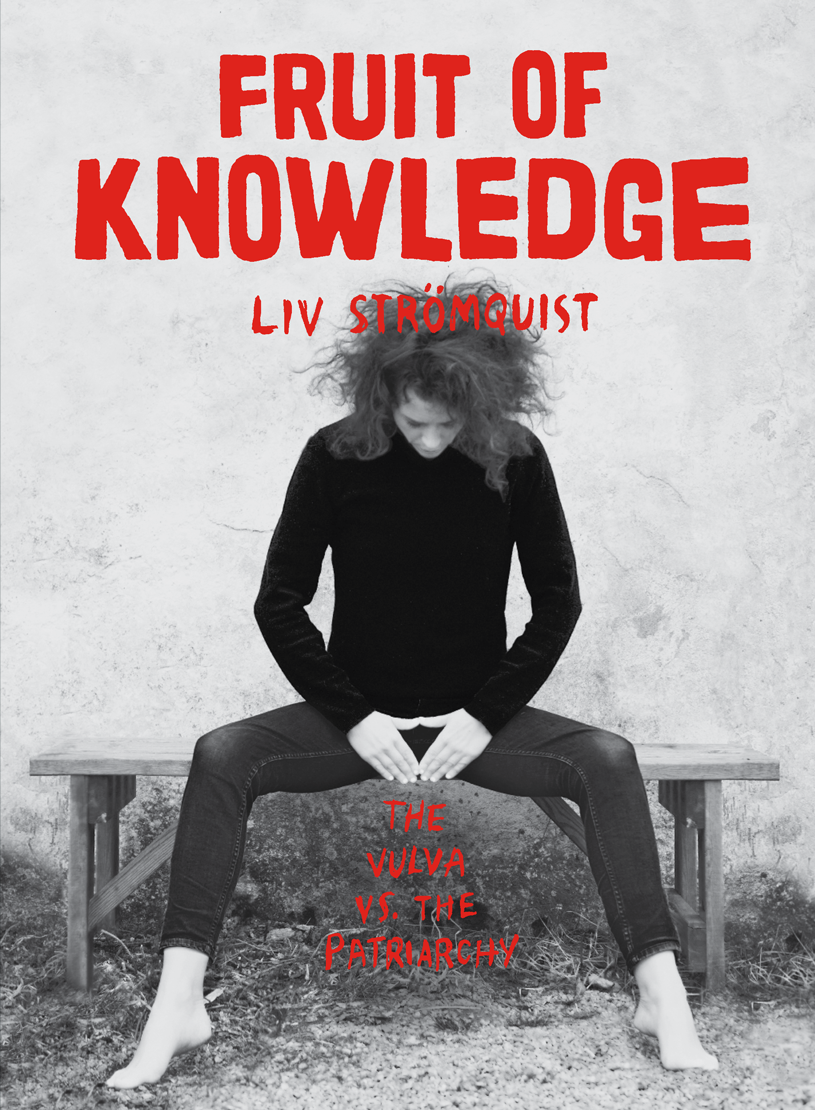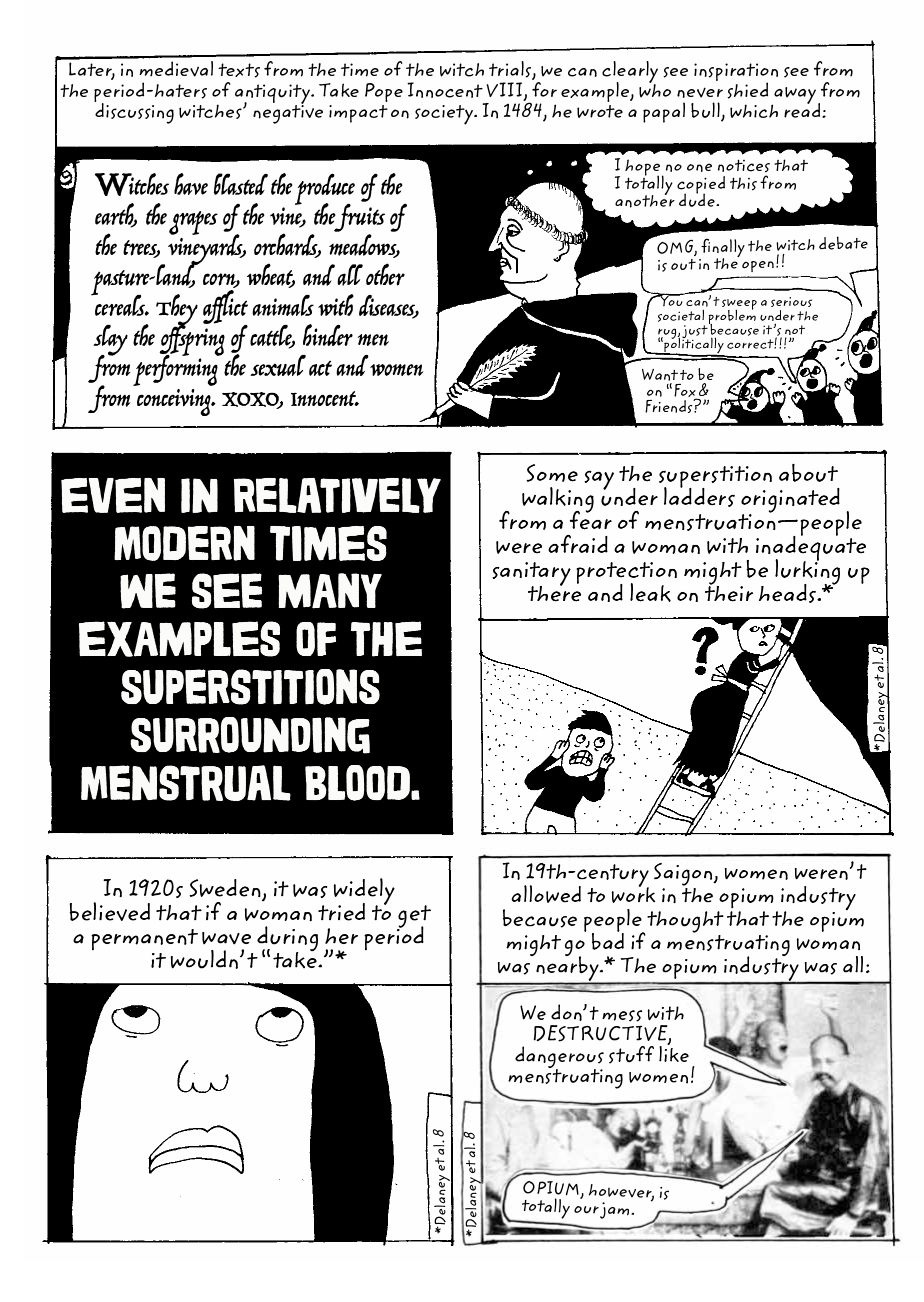The new book Fruit of Knowledge: The Vulva vs. The Patriarchy, by Swedish radio host and graphic novelist Liv Strömquist, mentions that the word taboo comes from the Polynesian word tupua, or menstruation. Tupua is spoken of in hushed tones not because it is dirty or shameful; tupua also means sacred or holy. Other things that are tupua: Burial sites and wounded soldiers.
Learning to appreciate the sacred nature of women’s sexuality and sex organs is the major thrust of Fruit of Knowledge, the English translation of which arrived in stores at the end of August from Fantagraphics Books. With a keen historian’s eye and a scathing satirist’s tongue, Strömquist exposes the centuries of historical hysteria and discomfort hiding away the truth about women’s sexuality.
While the book possesses an underlying bitterness, it’s extremely funny. When I told Strömquist I literally laughed out loud three panels into the book, she said that humor was her goal.
“There is a cultural perception that feminists are really boring and never can laugh or joke about anything, or take a joke about themselves,” she said. “So I enjoy going against that assumption. Also it’s good to laugh when you talk about heavy and depressing things. I’ve always liked joking and humor, since I was a little girl and watched Monty Python. For me it’s really important that my comics are fun to read. I don’t like boring stuff!”
RELATED: Talkin’ Politics with Me The People’s Pia Guerra & Lil’ Donnie’s Mike Norton
Using comedy to educate is a tried-and-tested model, as Strömquist digs into historical trends about how women’s sexuality has been viewed over time and examines how those views have evolved. But at the core, the patriarchy has enforced just two models of feminine sexuality -- the frigid prude and the bawdy whore, templates that women confront in both the physical pursuit of sex and their emotional tenor. (Reading the book, it’s clear that the 19th century must’ve been the worst century ever for sex.)
Strömquist found the research for the book fascinating. “It was so interesting for me to discover that, in the 1600s and 1700s, women were generally considered to have a higher sex-drive than men. The stereotype was that women were unable to control themselves and were controlled by their bodies. A hundred years later this was flipped the other way around. What it tells us [is] that how we perceive each other’s sexuality and bodies is largely a cultural construct.”
From the archaeological records we have, we know that women’s sexuality wasn’t always hidden away and ignored. Menstruation and sex were often considered sacred. Menstruation is, after all, the indicator of a woman’s ability to carry on the human species.
“Well, we know very little of early stone age history,” Strömquist admitted, “but we can see on the imagery of early fertility religions that sexuality, reproduction, the female body and the vulva are portrayed in a quite explicit way. There is a big change in human history when the religions and cults of fertility are replaced with the monotheistic religions. In the monotheistic religions, there are only male deities.”
Page 2: [valnet-url-page page=2 paginated=0 text='Views on Women’s Sexuality Might Have Changed for One Reason - Religious Competition']
Indeed, the writings of St. Augustine are a marker as some of the earliest sex shaming. Strömquist expanded on that religious influence and how that early position was introduced and passed down through the centuries.
“There is a clear shift where the female body, female sexuality (and all kinds of human sexuality) is removed from the ‘sacred’ to the ‘opposite of the sacred,’" said said. "I think you can explain the very overt hatred and fixation that the monotheistic religions have with the female body and sexuality with the fact that they -- in their early stage -- were in competition with fertility cults.”
In case you doubt the depth of our societal reluctance to look at female sexuality, the first person to discover the size and shape of the clitoris did so in 1998. In all the anatomical study done prior to that point, nobody bothered to determine this.
“It’s really horrible," said Strömquist. "And when I was researching for the book I discovered that biology books that are still used today in Sweden describe the clitoris as a ‘small dot.’”
Even the language used to talk about sex organs diminishes women’s sexuality. You hear it all the time with children -- boys have penises, and girls do not have penises. Women are defined by the absence of a sex organ rather than the presence of their vulva.
RELATED: Cartoonist Liz Prince’s Look Back and Laugh Collects a Year of Daily Strips
“I think it really affects us in a quite deep psychological way,” Strömquist explained, “and gives us a bleary feeling of who we are. I think it lowers our self-esteem.” While ads encouraging men to enhance their organs are inescapable, Strömquist observed, “it is really telling that the plastic surgery that women want when it comes to their sexual organs is minimizing the inner labia.”
Changing how society views women’s sexuality is an uphill battle that even Strömquist realizes will take a long time. She has a chapter in her book dedicated to real quotes from women revealing how little many of them know about their own bodies and how many of them are uncomfortably learning more. “I think a good way of changing this is to read my book,” she says with a sly grin.
In Sweden, Strömquist is a cartoonist and radio host, so she has multiple platforms to pursue education on these issues. “I participate regularly in two different podcasts, one is commenting on news and society, like a political satire show, and the other is about other cultural stuff.”
On the air and in print, she’s enthused about the reaction to her message. “I have gotten mostly positive response from readers,” she said. “There has been a little bit of debate over an exhibition that I did in the Swedish Metro, with pictures from the book displaying menstruating women, that caused a lot of angry feedback and some of the pictures were destroyed twice and had to be replaced with new ones."
Fruit of Knowledge came out in 2014 in Sweden, and Strömquist has stayed busy since then. “I made several books in Swedish and some of them have come out in other languages,” she confirmed. “I made one about romantic love, for example, and my latest book released in Sweden, called Rise and Fall, is about climate change and global capitalism.”
Fruit of Knowledge: The Vulva vs. The Patriarchy is now available.





